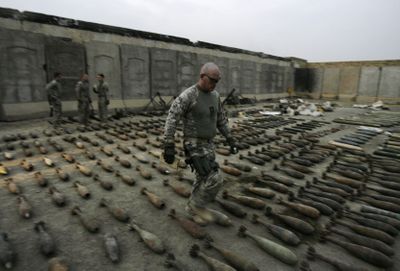Iraq seeks more changes on security agreement
Shiites, Sunnis remain wary as passage deadline nears

BAGHDAD – Iraq’s Cabinet asked for changes in a U.S.-Iraqi security agreement Tuesday, once more casting doubt on the document’s speedy passage with less than three months to go before the U.N. mandate authorizing the presence of American troops in Iraq expires.
The first Cabinet session reviewing the document revealed what a divisive issue the security agreement has become. Only the country’s Kurdish bloc is publicly backing the current accord, while Shiite Muslim and Sunni Arab allies of the United States remain wary of endorsing the draft, which had been described by both Americans and Iraqis as in its final form. The Iraqi side again called for more negotiations.
“The Council of Ministers has unanimously agreed that there are necessary amendments which need to be made to the current draft in order to raise the agreement to a nationally acceptable level,” government spokesman Ali al-Dabbagh said in a statement.
The slow pace means an agreement might not be reached before the U.S. presidential election in two weeks, and that Iraqi and U.S. negotiators might ultimately forgo a long-term security agreement in favor of a more temporary arrangement.
In Washington, Secretary of Defense Robert Gates told reporters that the door to change was “pretty far closed” and warned that failure to reach a deal or renew the U.N. mandate would mean suspension of U.S. operations.
One Iraqi government official who attended the session said the Cabinet would start debating the suggested changes Sunday. He described the new objections as proof that the main factions in the government, particularly Shiite, are reluctant to risk their political future on an agreement that has been assailed by Iran and Iraqi cleric Muqtada al-Sadr, a rival to the ruling Shiite coalition.
The Cabinet session Tuesday crushed lingering hopes that meetings last week involving Prime Minister Nouri al-Maliki, Iraqi President Jalal Talabani and other top leaders might marshal the political will to shepherd the agreement through parliament.
Expectations were already low after al-Maliki’s political coalition, the United Iraqi Alliance, or UIA, called for changes in the document’s wording over the weekend.
The official who attended Tuesday’s Cabinet meeting said some ministers called for the agreement to be put before a national referendum. Ministers also demanded alterations to the language regarding immunity of U.S. troops from prosecution in Iraqi courts and calling for a withdrawal of U.S. forces by the end of 2011.
The language regarding immunity, according to a copy of the agreement obtained by the Los Angeles Times, provides U.S. military and government personnel protection from prosecution when they are on their bases or on missions.
The agreement, according to an official Iraqi interpretation, would allow the Iraqi government to petition a joint U.S.-Iraqi committee if someone commits a serious and premeditated crime while on duty. If both sides agree, the suspect could stand trial in an Iraqi court. But the language is not precise enough for Cabinet members.
Iraqi officials also have worried about the implications of a clause in the agreement allowing U.S. troops to stay beyond 2011 if both sides agree.